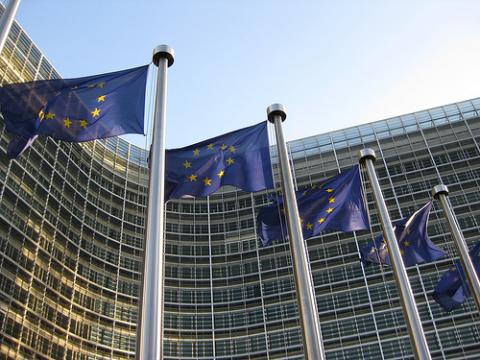A critical eye on the European project

Europe Day is an opportunity to celebrate the EU, but also a chance to turn a critical eye on the project, Eoghan Murphy argues
Europe is changing and we’re changing with it, quickly. There is little time to pause and catch one’s breath. Europe Day offers us an opportunity, but we need more such opportunities, and soon, if the people of Ireland and Europe are to continue with the European project.
Intervention in Libya by France and the UK, with our support, calls in to question a pillar of our foreign policy - military neutrality - and yet no one is talking about that.. Decisions are being made in the midst of the financial crisis, through the Pact for the Euro and other agreements that will see macro level financial controls permanently relinquished to Europe. We will never return to the financial independence that we enjoyed pre-crisis; have we thought that far ahead?
Where European integration once moved at a snail’s pace, we are now at a sprint. Is our democracy capable of handling this pace? Is Europe?
Europe Day is a day to recognise and celebrate our union, but it must also be a day to question it, even to criticise. As one can stand up and speak in favour of the EU without being a Europhile, so too can one speak against it without being a sceptic. We have a responsibility in a democracy to make such challenges and in fact this is what the whole parliamentary system of democracy is premised upon. So too the European Union.
Fintan O’Toole wrote recently about the ‘false alternatives’ in the current debate about Europe. Lines had been drawn between ‘good’ and ‘bad’ Europeans, and the meanings of each had been fixed. He was questioning these now fixed interpretations with a view to inverting them.
Jacques Derrida referred to this as ‘violent hierarchies’: dealing in absolutes where they don’t exist, and using political power structures to subjugate one to the other.
It is very much in evidence at the moment when anyone writes or speaks on the topic of Ireland and the financial crisis in Europe. Because of the financial lifeline given, commentators find themselves unfairly boxed into “with us or against us” positions. (My colleague Peter Mathews is perhaps the only person I have heard contribute in a meaningful way outside of these false alternatives.)
Europe is about much more than economics and yet our current situation is keeping us from exploring our future in Europe, both inside and outside of the financial context. It is also keeping us from doing so in a reasonable manner.
International discussion over the corporate tax rate has augmented this problem here and has done damage to the European project in my view, at home and abroad. The spectre of another nation’s head of state, a European partner and friend, attempting to intervene so directly in our internal affairs is disturbing, even if only to help his own national position.
But if Irish people perceive even a remote possibility that the level of our corporate tax rate is actually under threat, aside from the grandstanding at political level on both sides, then all those doubts raised pre Lisbon I and II – which many of us thought ridiculous – take on a new dimension. What was once ‘impossible’ is no longer so.
An honest and reasoned debate on Europe must be held in this country. We have seen that such debate is incredibly difficult to achieve at times of referenda and our current circumstances may not make it any easier. But if the EU is to come through these difficult times, in Ireland’s eyes at least, then this is crucial.
A big criticism of the European project, since its inception, has been its lack of connectivity with the people. Much of this has been a communications problem. But much of it also has to do with the top-level down approach to progressing the project; a sense that political leaders have moved faster than the people they represent, breeding suspicion in certain quarters. Recent developments will do nothing to allay these fears, but may likely heighten them.
The sitting of Dáil Eireann to mark Europe Day is a welcome initiative. While it might seem superficial to some, it is in fact a commitment to give national time to important issues. Such commitments continue in the Programme for Government and will ensure that Ministers do not bypass the Oireachtas and make decisions in Brussels without prior scrutiny by elected representatives here.
The responsibility that we also bear, as representatives of the people, is to communicate and engage with the people we represent on these issues of national importance before the EU, so that we all move together at the same pace and with a shared understanding of where it is we are actually going. This will require new attitudes and new approaches.
That process begins first with time to pause and think. It begins with Europe Day.
Image top: TPCOM.
